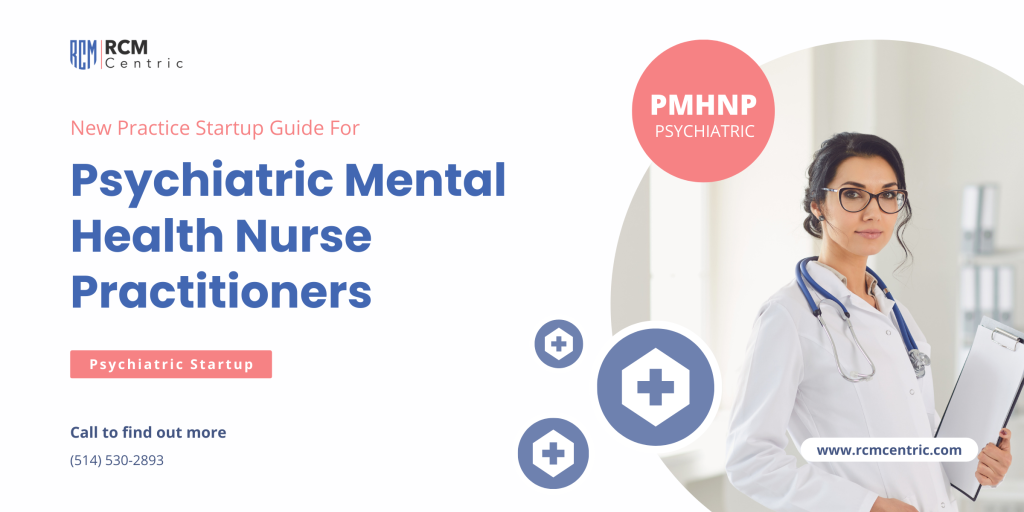Psychiatric Mental Health Nurse Practitioners (PMHNPs) play a critical role in the healthcare industry, providing comprehensive mental healthcare services to patients. Starting a new practice can be challenging, but it can be a rewarding and profitable venture with the proper planning and preparation. A medical practice setup is required for PMHNP-BCs who wish to start a private practice because it provides a framework for running a business that complies with legal and regulatory requirements. Medical practice is a legal entity that allows the PMHNP-BC to provide care to patients in a professional manner. It also allows the PMHNP-BC to obtain insurance coverage, accept payment, and manage billing and collection. Here is the complete guide for new practice startup for Psychiatric Specialists – PMHNP-BC.
How to Start a New Private Practice for PMHNP-BC
Starting a new private medical practice can be challenging but rewarding for healthcare professionals. A new medical practice requires careful planning, hard work, and dedication. However, with the right approach, you can build a successful and rewarding business that helps patients and contributes to the healthcare industry.
To start a medical practice as a PMHNP-BC, you must meet several qualifications, which may vary depending on your state and local laws. Here are some of the standard qualifications required for new practice startup for Psychiatric:
- Education and Licensing
- DEA Registration
- NPI Number
- Office Space and Equipment
- Business License
- Tax ID Number
- Medicare and Medicaid Enrollment
- Electronic Health Record (EHR) System
These are some qualifications required to start a medical practice as a PMHNP-BC. Researching and complying with all relevant federal, state, and local regulations is essential to ensure you operate your practice legally and ethically.
Here are vital steps to consider for a new practice startup for Psychiatric.
1 – Qualifications
Before starting your private practice, you must obtain the necessary qualifications. To become a PMHNP, you must be a registered nurse (RN) with a master’s degree in nursing and have completed an accredited psychiatric-mental health nurse practitioner program. You must also pass a national certification exam to obtain your PMHNP license.
2 – Models of Private Practice
As a PMHNP, you have several private practice models to choose from. These include a solo practice, a group practice, or an integrated practice. Each model has its benefits and drawbacks, so it is essential to research and choose the one that best fits your needs and goals.
Here are 7 Business Modes for Private Practices for Healthcare Professionals:
- Solo Model
- Co-op Model
- Contract Model
- Group Model
- Sublease Model
- Employment Model
- Non-Traditional Services Model
There isn’t a right or wrong way to approach private practice, and often a combination of different models can be effective. Many therapists, for example, use both the solo and contract models in tandem to keep a steady caseload. Similarly, mental health and wellness professionals may belong to one of these models and engage in the sublease model, renting out their unused space to other professionals. It’s essential to find a combination that suits your needs and lifestyle at the present moment and allows for flexibility in the future.
3 – Setting up the Practice
Once you decide on the private practice model you want to pursue, you must set up your practice. This includes finding a location, purchasing equipment and supplies, and hiring staff. Below are the 7 steps for starting or setting up a medical practice for Nurse Practitioners:
- Create Business Plan
- Secure Financing
- Sort Out Paperwork & Credentials
- Find a Location
- Buy Equipment / Practice Management Software
- Online Presence
- Make Administrative Decisions
Location: When selecting a location for your practice, consider accessibility, proximity to your target market, and rent costs. A convenient and accessible location can attract more patients.
Credentialing & Enrollment: Credentialing is an important process for any PMHNP-BC practice. It ensures that the practitioner has the necessary knowledge, skills, and training to provide safe and effective care to patients, and builds trust between the practitioner and their patients. To get paid fast for the services you provided, you must be credentialed with the insurance companies or payers.
Equipment and Supplies: You must purchase essential equipment and supplies such as office furniture, computers, and software to manage patient records for a new
Hiring Staff: You may need to hire additional staff, such as receptionists or nurse practitioners, depending on the size of your practice and patient load.
4 – Registering the Business
Before opening your practice, register your business with the state. This typically involves selecting a business name, obtaining a tax ID number, and obtaining necessary permits or licenses. Check with your state’s business registration office to learn more about the requirements for registering your PMHNP practice.
The documents required for registering a business can vary depending on the type of business structure and the state. However, some standard documents that may be required include:
- Articles of Incorporation or Articles of Organization (depending on whether you are setting up a corporation or an LLC)
- Business license application (varies by state and industry)
- Employer Identification Number (EIN) from the IRS
- Certificate of Authority if registering a foreign (out-of-state) entity in a new state
- Operating Agreement or Bylaws (depending on the business structure)
- Shareholder or member agreement
- Business name registration
- Trademark or service mark registration (optional)
- Sales tax permit (if applicable)
It’s important to check with the state and local government agencies where you plan to register your business. Get professional credentialing services or help in registering your business in the healthcare business category.
5 – Incorporating Your Business
Incorporating your business can provide you with legal protection and potential tax benefits. There are several business entities, such as a limited liability company (LLC) or a professional corporation (PC), to choose from. Consult with an attorney or a business advisor to determine the best option for your practice. When incorporating a medical practice, there are several options for business structures that you can choose from. Here are some of the most common options:
A professional corporation (PC): A PC is designed for professionals requiring a state license to provide services. In this case, a PC is designed for medical professionals. This type of structure can limit the owners’ personal liability and offers some tax benefits.
Limited liability company (LLC): An LLC is a hybrid business structure that combines a corporation’s limited liability protection with a partnership’s tax flexibility. This is a popular choice for medical practices because it offers personal liability protection and tax benefits.
S Corporation: An S Corporation is a special type that allows the business to pass its income, deductions, and credits through to its shareholders for federal tax purposes. This structure can offer tax benefits for smaller medical practices.
Sole proprietorship: A sole proprietorship is the simplest business structure owned and operated by one individual. While this option offers little legal protection for the owner, it is the easiest and least expensive option to set up.
When deciding which structure to choose for your medical practice, it’s important to consider factors such as your liability, tax implications, and the size and complexity of your practice. You may think of a consulting lawyer or accountant to help you make the best decision for your needs.
6 – A Business Bank Account
Opening a business bank account can help you keep track of your practice’s finances and separate them from yours. You must provide the bank with your business registration information, tax ID number, and other relevant documentation. To open a business bank account for a medical practice, the following documents may be required:
Business identification: This includes the articles of incorporation, articles of organization, or a partnership agreement, depending on the legal structure of the practice.
Employer Identification Number (EIN): The IRS assigns a unique number to identify your business. You can apply for an EIN online or through the mail.
Business license: Depending on the state and local regulations, you may need to provide a copy of your business license.
Business address verification: You may need proof of your business address, such as a lease agreement or utility bill.
Identification of authorized signers: You’ll need to provide identification for all authorized signers on the account, such as a driver’s license or passport.
Business banking resolution: This document outlines who has the authority to conduct transactions on behalf of the business.
Initial deposit: You’ll need to make an initial deposit to open the account, which can vary depending on the bank and account type.
It’s always a good idea to check with the specific bank you plan to use to determine their exact requirements for opening a business bank account.
7 – Marketing Your New Private Practice
Marketing is essential for any new medical practice as it helps to create awareness about your services and reach potential patients. A well-planned marketing strategy can help you establish your practice in the local community, differentiate your services from competitors, and build a strong reputation. It can also help you reach your target audience and generate leads that can convert into long-term patients.
Marketing can also help you to:
- Build Trust
- Increase Visibility
- Create Patient Loyalty
- Stay Competitive
Marketing is crucial for any new psychiatric practice startup to establish a strong presence in the community, attract new patients, and build a successful practice. Once your practice runs, you must market your services to attract patients. There are several ways to market your practice.
Steps to Market Your Practice Startup for Psychiatric Services
Develop a professional website: A well-designed website highlighting your services, credentials, and practice can be an excellent tool for attracting new patients. Make sure your website is mobile-friendly and optimized for search engines. Get your website for a new Medical Practice here.
Leverage social media: Social media platforms like Facebook, Twitter, and Instagram are great tools for building your brand and reaching new patients. Regularly post engaging content, including health tips and information about your services.
Join local business directories: Online directories like Yelp and Google My Business can help potential patients find your practice. Make sure your business information is up-to-date and accurate.
Attend community events: Participating in local health fairs, community events, and other gatherings can help you network with other professionals and raise awareness about your practice.
Offer promotions: Offering special promotions, such as free consultations or discounts on services, can effectively attract new patients and build your practice.
Ask for patient referrals: Word of mouth is still one of the most powerful marketing tools. Encourage your current patients to refer their friends and family to your practice.
Partner with other healthcare providers: Partnering with other healthcare providers, such as primary care physicians or physical therapists, can help you expand your network and reach new patients.
Remember, marketing is an ongoing process, so it’s important to regularly review and adjust your strategies to ensure they effectively meet your goals. Here is the best medical practice marketing specialist who can help your practice grow and improve your online presence in the market.
Conclusion
In conclusion, starting a psychiatric mental health nurse practitioner (PMHNP) practice can be a fulfilling and rewarding experience for those with the qualifications and entrepreneurial spirit. By following the proper steps and seeking the right support, you can establish a successful private practice.
At RCM Centric, we understand that starting a new practice can be overwhelming, and we’re here to help. Our team of experts can provide various services, from setting up your business to managing your finances and marketing your practice. We offer tailored solutions to meet your specific needs and goals, so you can focus on providing the best possible care to your patients.
Whether you’re starting or looking to grow your practice, we can help you navigate the challenges of running a practice. So you can achieve success and make a meaningful impact in the lives of those you serve. Contact us today to learn about our services and how we can help you take your practice to the next level. Let’s connect with our experts and get professional services and help for your new psychiatric practice startup.
































